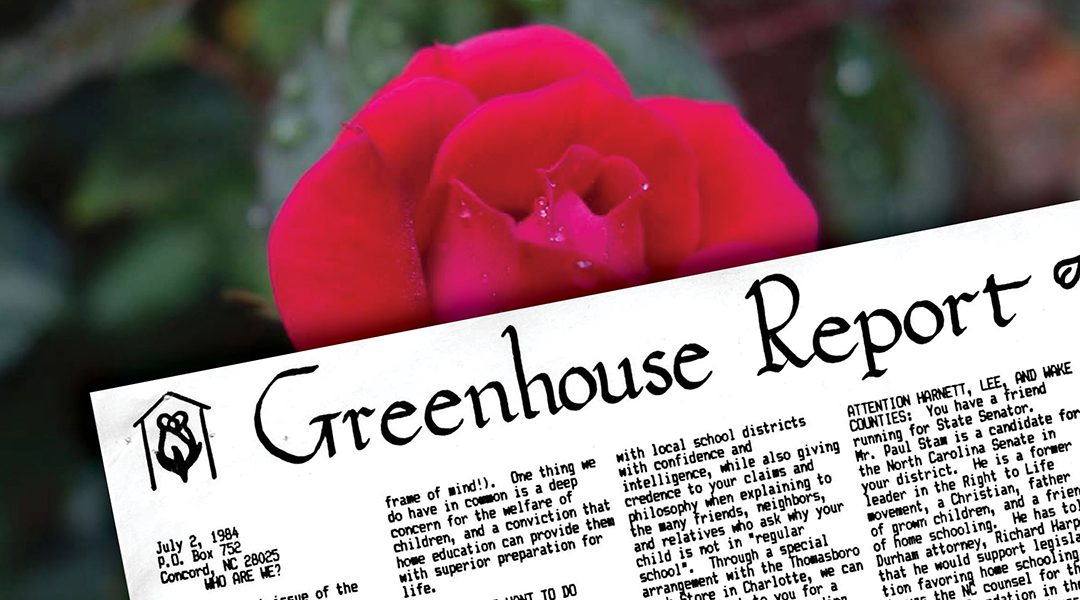Graduate 2021/Matthew McDill
There is a photograph of a rose on the cover of this graduate issue of the GREENHOUSE. You may have noticed that there is a rose on the cover of all of our graduate issues. This choice contains an important meaning and is a part of the history of GREENHOUSE magazine. In 1984, this publication was introduced as the Greenhouse Report and had as its logo a rosebud inside a greenhouse. In the second issue of the Greenhouse Report, an explanation was given for the name and logo.
“The rosebud was chosen because of a comment of Dr. Raymond Moore in a Teachers College Record article which has been reprinted and is a concise, clear description of the damage which early formal instruction can do to very young children, as well as an explanation of the benefits of delaying formal instruction until the ages of 8-10 years. Dr. Moore says, ‘The early stimulation theory is much like demanding that we force a tight, new rosebud to bloom—beautiful in its potential and perfect in its immaturity, but not yet fully ready to bloom. No matter how delicately it is forced to a premature bloom, the result is a damaged rose.* The home school can allow each child to blossom to a full and beautiful maturity as he becomes ready. So in our logo, we have placed the rosebud in the green (symbolizing life) house where it can be sheltered and grow undamaged to the fullness of its potential, becoming strong and lovely. Since the NCHE newsletter is a report on this process, the Greenhouse Report seemed a fitting title.”
A rose was eventually included in our NCHE logo as well. Although the rose does not remain in our logos today, we have kept it as the cover of all of our graduate editions of the GREENHOUSE. From the explanation above, you can see why the rose on the cover is a rose that is beginning to bloom. Graduation is a ceremony that symbolizes achievement and transition. It is a time that students traditionally close chapters and start new ones. It is a time in which formal home education, in the traditional sense of high school, comes to an end. Our goal is that we have patiently and lovingly provided a safe, fertile place for our children to flourish and bloom. We give thanks and glory to God for His grace and help to fulfill this wonderful responsibility.
Growing a flower is a good analogy for raising children. In one sense, we can significantly affect the growth of a plant. On the other hand, the growth of a flower is an amazing miracle beyond our understanding. Let’s review the principles that appear in this analogy. As we do, parents who are graduating students can give thanks and praise to God for his faithfulness through the process. These principles will also be a good reminder for those of us who still have children at home.
Let your children’s curiosity and interests set the pace in early education.
Many parents are still tempted to push formal education too early. Some are influenced by the strategy of the public school system. Some are motivated by fear of doing something wrong or of failing their kids. The good news is that education can start off fun and there are no benchmarks that children must meet by a certain age. Even when you’ve started more structured education that covers the foundational subjects, you can continue to let the student’s curiosity and interest set the focus for their studies.
Provide a safe nourishing place for your children to grow and flourish.
Home is a place of love, acceptance, safety, and training. You can rely on God to give you the wisdom to know how to protect your children and also introduce them to real life with your guidance. They must be both protected and given space in order for healthy growth to occur.
Trust God to produce the real growth.
Paul wrote, “I planted, Apollos watered, but God gave the growth. So neither he who plants nor he who waters is anything, but only God who gives the growth” (1 Corinthians 3:6-7). Our role as parents in raising our children is very important. But this must be seen in the context of our stewardship under God. He has a purpose for their lives and loves them more than we do. We can trust him to help them grow into what He’s designed them to be.
* “Research and Common Sense: Therapies for Our Homes and Schools,” Teachers College Record, Winter, 1982, p. 395.




